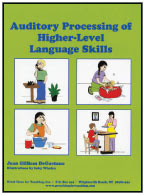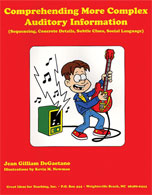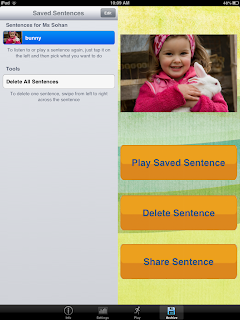I will be reviewing 2 items from Great Ideas for Teaching that can be utilized to target auditory processing skills for those with higher level abilities.
Auditory Processing of Higher-Level Language Skills ($32) is meant to assist students in learning to interpret events, gaining an understanding of concrete and subtle interpretations, and helping to grasp the main points of each event. Students who have may have trouble working through Auditory Processing of Higher-Level Language Skills should check out my review of Auditory Processing of Early Language Comprehension Skills to determine if it would be a better fit.
While looking at an image, students are read a story about the picture. Various questions that gauge specific comprehension skills are then asked. Questions are related to sequencing, context clues, inferencing, as well as time and spatial concepts.
The review questions are simple and straightforward, requiring students to recall important details from the brief passages (e.g. What is the horse's name?) Questions get progressively difficult as they prompt students to form their own conclusions, separate subtle information amongst stories, make predictions, and retell the story. See below for sample pages.
Comprehending More Complex Auditory Information (Sequencing, Concrete Details, Subtle Clues, Social Language) ($32) includes questions that target similar skills as Auditory Processing of Higher-Level Language Skills with an emphasis on sequencing. Images are provided to students as they listen to a two or three part story. There is an abundance of questions provided for users, which I personally appreciated as it saved me some preparation time. Take a look below for a few sample pages.
Another important skill I impress upon my students when note-taking is the use of symbols and abbreviations. It was surprising to see how many of my kiddos were trying to write down the sentences verbatim. Text messaging language is a frequent example I use to drive home the benefits of using shorthand. I also found a handout from the University of North Dakota to be a helpful way to introduce and review abbreviations.
There are an infinite amount of resources available for us to utilize with students, but there is also an infinite amount of ways to utilize the resources we already have. Auditory Processing of Higher-Level Language Skills and Comprehending More Complex Auditory Information (Sequencing, Concrete Details, Subtle Clues, Social Language) are both easy to modify and extend into lessons targeting critical thinking, memory, visualization, and so much more!
Disclosure Statement: Great Ideas for Teaching, Inc. provided resources for testing in exchange for a review. The opinions expressed in this review are mine. No other compensation was provided.














